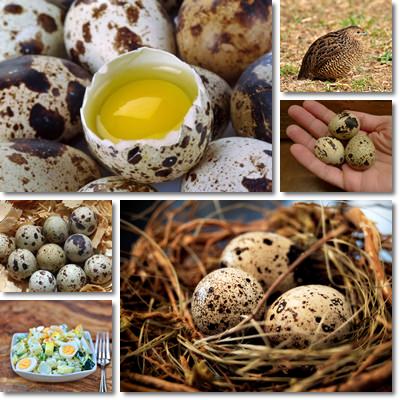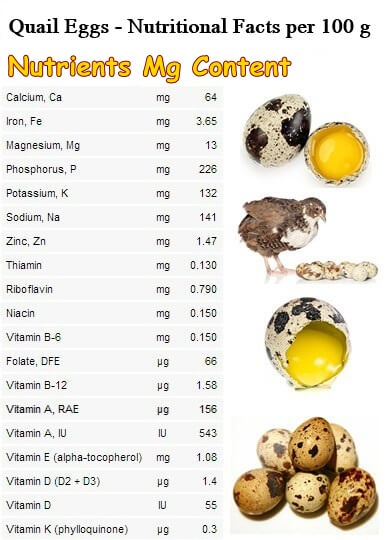Quail eggs are recognized for their superior nutritional value and represent a healthy food, suited for essentially any diet. With a generous vitamin, mineral and protein content, they provide excellent nutrition. Quail eggs are an important source of vitamins A and D, B vitamins, especially vitamin B12 and provide good amounts of iron and phosphorus. They do have a high cholesterol content which means diabetics and people with high cholesterol and existing cardiovascular disease should limit their intake or substitute them for chicken eggs which have less than half of their cholesterol. Other than this, quail eggs represent a healthy food with numerous health benefits.
What do quail eggs look and taste like?
Quail eggs are relatively small: 1 quail egg weighs about 9-10 g, compared to a medium-large chicken egg which weighs around 50 g. The eggs have a distinctive shell, grayish or yellowish in color, with irregular brown and black speckles and spots of different sizes. This helps camouflage them in the wild. The egg shell is quite fragile and can break easily. The white and golden yolk inside look a lot like those of any egg, just at a smaller scale.
You can cook quail eggs as you would any other egg variety and they taste roughly the same. The only difference in taste between quail and chicken eggs is the first have a slightly richer flavor as a result of the higher yolk- egg white ratio, but still overall similar in taste.

What do quails look like?
Quail eggs are laid by quails known by the scientific name Coturnix coturnix. Quail are a species of small bird found throughout Europe and Northern Africa and related to pheasants. They live freely in the wild and thus are considered a species of game. Although migratory, the birds can be domesticated. Quails live and nest on the ground, feeding on insects and seeds from crops and native plant species. It is common to find quails nesting in wheat fields, which provide excellent camouflage and a plentiful source of food, although all farmlands are suitable.
They are small birds that can fit in the palm of one’s hand, one quail weighing anywhere from 100 to 130 g. They are stout-looking, thick and bulky, with long wings, a russet to dark brown plumage, darker on the back and lighter on the chest and abdomen. The common quail has fallow to dark brown stripes on the back that go lengthwise and a distinct white eyestrip extending towards the back of the head. Male quails have a white chin, a brown-colored spot beneath it, with plain-colored chest feathers, while the females have speckled chest feathers.
How many eggs per day do quail lay?
Quail can lay 1 and sometimes even 2 eggs a day continuously throughout the year, provided they are kept warm during cold fall, winter and spring months, and fed well. Bird feed containing different kinds of more finely ground grains (corn, rice, wheat, spelt, soybean etc.) as well as fruit and vegetables such as tomatoes, melons and watermelons are ideal for raising quail.

Quails eggs health benefits
Quail eggs are about just as nutritious as chicken eggs, in some ways only slightly more nourishing, and are best eaten in moderation. Below is a list of the most relevant nutritional properties and health benefits of quails eggs.
- Less allergenic than chicken and other eggs.
- Source of benefits for anemia thanks to a good content of iron and vitamins B9 and B12 which help make red blood cells and hemoglobin in red blood cells to transport oxygen to tissues.
- Easy on the stomach, good food to eat for gastritis and other digestive disorders.
- High in protein with benefits for repairing damaged muscle, building new muscle and losing weight.
- Contain all essential amino acids for brain and nervous system health.
- Potential benefits for brain fog, mood swings, memory, support for learning owed to fatty acids and protein in the eggs.
- Source of vitamin B9 which promotes normal brain development of babies during pregnancy.
- Help prevent neural tube defects of the brain, spine and spinal cord in babies during pregnancy owed to a good content of vitamin B9 (folate).
- Good content of vitamin B12 and cholesterol for healthy nerve cells. Vitamin B12 and cholesterol in quail eggs lower risk of demyelination (loss of the protective myelin coating surrounding nerve cells), potentially contributing to reduced risks for multiple sclerosis and other degenerative diseases of the nervous system.
- Boost immunity thanks to a good vitamin D content and a generous protein content. Vitamin D in quail eggs modulates the immune system function, while protein helps build antibodies.
- Good for strong bones and teeth as a result of a good content of phosphorus and vitamin D and small amounts of calcium and magnesium.
- Benefits for hair – eating quail eggs helps you have strong hair thanks to a high protein content.
- Potential benefits for eczema and psoriasis owed to the nutritional value of the eggs.
- Potential benefits for allergic rhinitis and asthma, although more research is needed on the topic.
- Good for fertility: quail eggs both boost fertility in men and women via vitamins and minerals such as vitamin D, selenium, manganese and zinc, and support good pregnancy outcomes.
- Benefits for high blood sugar levels – quail eggs are a very low GI food with benefits for blood sugar control, and lower the impact of other foods on blood sugar.
- Antioxidant properties from vitamin A, copper, manganese, iron and fatty acids, with benefits for skin and eyesight.
Quail eggs nutritional information
Quail eggs nutrition facts per 100 g
Most, if not all of the benefits of quail eggs listed above can be attributed to a high nutritional value. The most prominent nutrition facts of quail eggs include:
Vitamins and minerals in quail eggs
- Vitamin B1 (thiamine): 0.130 mg, about 11% of the recommended daily intake, RDI
- Vitamin B2 (riboflavin): 0.790 mg, more than 50% of the RDI
- Vitamin B6: 0.150 mg out of the total 1.7 mg needed, almost 10% of RDI
- Vitamin B12: 16 quail eggs at 10 g per egg or 17 quail eggs at 9 g per egg provide 100% of the RDI
- Vitamin D: 55 IU of the total 400 IU, around 25% of the RDI
- Vitamin A: 156 mcg/100 g, out of the 900 mcg RDI
- Iron: 3.65 mg out of the 18 mg needed, about 20% of RDI
- Phosphorus: 226 mg out of the 1250 mg needed, about 20% of RDI
- Sodium: 141 mg, out of the 2300 mg maximum intake
- Small amounts of calcium, magnesium, potassium, zinc, vitamins B3 and B9
Macronutrients in quail eggs (calories, carbs, fat, protein, cholesterol)
- Calories: 158 kcal/100 g (and 14 kcal/ 9 g egg
- Protein: 13.05 g
- Fat: 11.09 g
- Cholesterol: 844 mg, 77 mg/ egg
- Carbohydrates: 0.41 g
- Sugars: 0.4 g
- Fiber: 0 g

Other purported health benefits of quail eggs
Quail eggs and diabetes
Quail eggs are best known for their anti-diabetes benefits. But this is only a half-truth. Quail eggs do not treat diabetes. They may however help control blood sugar levels. This is because they are high in fats and protein, both of which take longer to digest. The longer digestion time means blood sugar levels overall will raise more slowly and constantly, contributing to better blood sugar control. And this is where the benefits come from. If you are diabetic, talk to your doctor first before introducing quail eggs into your diet.
Bellow you can see the nutritional table with vitamin and mineral values for 100 g of quail eggs.
Quail eggs benefits derived from fats and cholesterol
First, let’s debunk the myth: quail eggs are not cholesterol free – not only do quail eggs have cholesterol, but they have more cholesterol than chicken eggs. And it’s the same type of cholesterol as in chicken eggs and duck eggs and goose eggs, the only one there is in animal products.
Chicken vs quail eggs cholesterol content
- 100 g of quail eggs (11 eggs, 9 g per egg) have 844 mg of cholesterol
- 100 g of chicken eggs (2 medium to large eggs, 50 g per egg) 373 mg of cholesterol
- 1 quail egg (9 g) has 76 mg of cholesterol
- 1 chicken egg (50 g) has 186 mg of cholesterol
Chicken vs quail eggs fat content
- 10.6 g of fat/100 g of chicken eggs
- 11.09 g of fat/100 g of quail eggs
If you are already eating plenty of animal products, processed foods, sweets and have a high intake of fats and cholesterol in general, eating quail eggs in addition to what you are currently eating might not be good for you simply because it adds to your dietary excesses. But if you are already overweight and have associated high cholesterol and some form of heart disease, then adding more high-fat, high-cholesterol foods to your diet is not healthy for you, whether the fat and cholesterol come from healthy foods or unhealthy foods.
Despite their high fat and cholesterol content, quail eggs remain a healthy choice if consumed in moderate amounts, as part of a varied and balanced diet. If you have a clean diet that is low in fat, quail eggs can be a healthy addition to your diet. Because, as research shows, cholesterol from food does not directly raise blood cholesterol levels. Not only this, but cholesterol is good for you. Cholesterol from food helps the body synthesize hormones for fertility and contributes to good pregnancy outcomes. Cholesterol helps the body process vitamin D produced as a result of sun exposure. And it helps make bile acids for digestion, among other benefits.
Quails eggs and salmonella risks
The reason why quails eggs are reported to pose lower risks of salmonella infections is because of the birds’ higher body temperature which, in theory, does not allow Salmonella bacteria to thrive and multiply. However, over the years there have been numerous reports of quail eggs being contaminated with various pathogenic Salmonella bacteria.
Contamination may occur because of improper hygiene at the farms, contact of quails with other infected birds, improper handling of the eggs, including breaking the eggs or contact with other contaminated eggs, contaminated feed, higher heat resistance of certain strains or other reasons. And while it’s more likely the bacteria are present on the shell as a result of cross-contamination, not inside the egg, know there is still a risk, albeit lower than in the case of chicken or duck eggs.
How to handle quail eggs for consumption
Because quails eggs can be carriers of Salmonella bacteria, it is recommended to take precautions such as:
- Get your quail eggs from safe sources that can provide some form of certification.
- Discard broken or cracked eggs or eggs with blood, dirt or dried waste.
- Check the expiration date and avoid eggs kept at room temperature.
- Keep eggs refrigerated at all times at low temperatures.
- Avoid eating raw or undercooked quail eggs, especially if you are pregnant.
- Do not give raw or undercooked eggs to children, the elderly or chronically ill people.
- If frying, turn quail eggs on both sides or cover pan with a lid to ensure uniform cooking.
